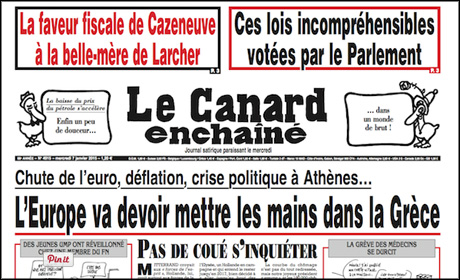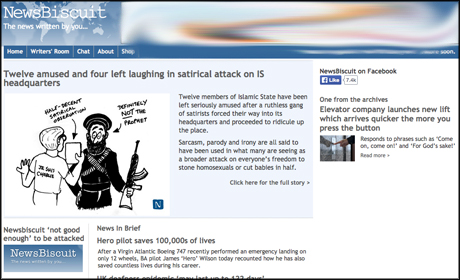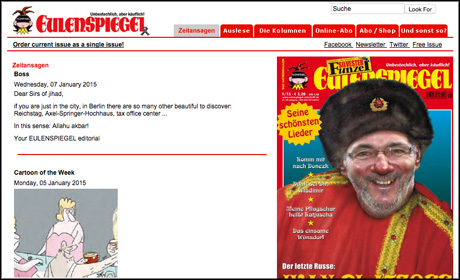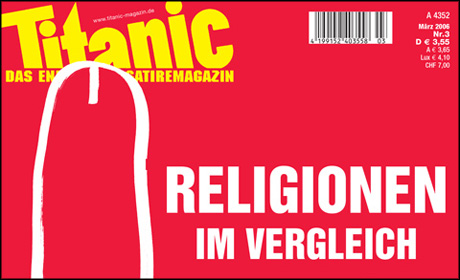
The terror attack on the French satirical magazine Charlie Hebdo, in which 12 people died, is a chilling example of the danger faced by many journalists as they go about their work.
Within an hour of the massacre in Paris, the hashtag #JeSuisCharlie was trending on Twitter as thousands of people expressed solidarity with those affected by yesterday's tragedy, and their support for freedom of the press.
Founded in 1970, Charlie Hebdo is an irreverent weekly publication featuring reports, jokes and cartoons. Its website is currently showing only a single poignant image of the Je Suis Charlie logo currently being shared across social media, but staff have vowed to increase their print run from 60,000 to one million for next week's edition.
Satire plays an important role in journalism, allowing reporters to question the staus quo with humour to underline a point and make it more accessible.
In the aftermath of the attack, perhaps Guardian cartoonist Steve Bell put it best: "We’ve got to stand up for the right to take the piss out of these monsters, these idiots, these fools, these posturing maniacs who strut around in their black gear as a kind of death cult trying to frighten us all."
Here are nine more satirical newspapers, magazines, websites and podcasts from the UK, Europe and USA that are worth checking out.
Private Eye

Caption: Screengrab from PrivateEye.co.uk
An obvious one, but for good reason. It's Britain's best-selling current affairs magazine, published fortnightly, and claims to have more than 700,000 readers. Founded in 1961 and edited by Ian Hislop, the magazine's main targets are politicians, royals, journalists and businessmen like media mogul Rupert Murdoch, nicknamed The Dirty Digger.
Private Eye is no stranger to controversy, most notably following the death of Princess Diana when its front cover showed mourners outside Buckingham Palace beneath the headline "Media to blame" – a move which led to WH Smith pulling the magazine from its shelves.
An interview with Hislop, published in 2006 by The Independent, claimed him to be "the most sued man in English legal history".
Le Canard Enchaîné

Screengrab from lecanardenchaine.fr
This weekly French newspaper, which marks its centenary this year, covers investigative journalism, French politics and the Eurozone, flavoured by satire in the vein of Private Eye.
Jean Cabut, a cartoonist for Charlie Hebdo who died in yesterday's attack, had also worked for Le Canard.
Its name translates translates as The Chained Duck or The Chained Paper ('canard' is french for 'duck' but also slang for 'newspaper').
In 2005 revelations made by the outlet regarding French politician Hervé Gaymard's luxurious state-funded apartment led to his resignation.
The Bugle
Billed as "an audio newspaper for a visual world", The Bugle is an offbeat weekly podcast in which hosts John Oliver – formerly of The Daily Show with John Stewart – and Andy Zaltzman pick apart the big issues of the day with sharp insights and slightly chaotic humour.
After being hosted by Times Online for four years The Bugle has now struck out on its own and, determined to stick to an ad-free model, has launched a "voluntary subscription system" to ensure its longevity.
NewsBiscuit

Screengrab from NewsBiscuit.com
Launched in 2006 by John O'Farrell, a British scriptwriter who worked on programmes such as Spitting Image and Have I Got News For You, NewsBiscuit was originally a daily news satire site.
Its claims to fame include being the first to break the news of George Bush's inability to explain an "eight-year gap" on his CV.
The site has now become a submissions board where anyone can contribute material and readers rate stories and suggest edits. Some of the best pieces have been published in a book titled Isle of Wight to Get Ceefax: And Other Groundbreaking Stories.
Eulenspiegel

This Berlin-based monthly magazine succeeded the satirical publication Frischer Wind in 1954.
Founded in East Germany, its editor Hartmut Berlin noted in an interview with the Media Foundation of Sparkasse Leipzig that previous rewrites had only occured due to Soviet censorship, but "now it's the cash."
The interview goes on to reveal that a cover illustration, featuring a caricature of a Catholic priest having sex with his colleagues from the Protestant Church, was rejected because of potential loss of revenue.
Yesterday the Eulenspiegel website published an article reminding potential terrorists who might visit its office that "in Berlin there are so many other beautiful [things] to discover" [translation].
El Jueves

Screengrab from eljueves.es
Despite its name translating as "Thursday", this Spanish weekly magazine is actually published each Wednesday. Unconventional to the core, it was founded in 1977 and is dominated by cartoon strips parodying issues like religion and the monarchy.
When Spain's King Juan Carlos announced his abdication in June last year, 14 senior cartoonists from El Jueves resigned following a dispute with publisher RBA over the magazine's proposed front cover, which featured a cartoon depicting the King passing a crown of shit to his son Prince Felipe.
This was not the first time El Jueves had got into hot water over alleged insults to the crown. In 2007 the magazine was sequestered by law for a front cover caricature which portrayed the Prince of Asturias and his wife in a (slightly NSFW) compromising position.
Titanic

Screengrab from titanic-magazin.de
Another German magazine, founded in 1979 and published monthly.
In 2000 the publication was scandalised after sending hoax faxes to members of the FIFA World Championship committee, offering them bribes including cuckoo clocks and sausages if Germany's 2006 World Cup bid was successful.
The World Cup bid was indeed won by Germany, and when news of the hoax emerged Titanic was threatened with legal action as a result.
Other pranks from Titanic, according to Der Spiegel, include launching its own political party and demanding the historic Church of our Lady in Dresden, painstakingly rebuilt after being destroyed in the Second World War, be dismantled and the pieces used to erect a new Berlin Wall.
The Onion

Screengrab from theonion.com
A frontrunner in the world of satire, the Onion News Network publishes news stories, audio and video – often entirely fictional – to satirise current events.
Based in Chicago, The Onion began life as a print publication in 1988 and now exists solely online, operating a metered subscription model which offers five free articles a month.
Regular features include News in Photos – essentially a photograph and caption with no accompanying story – and "infographics" which are just a list of bullet points around a certain theme (for example, "make sure you're overeating the right foods" in How to stave off the winter blues).
The poker-faced manner in which The Onion writes its stories has sometimes resulted in them being reported as fact by other outlets, such as the article Kim Jong-Un Named The Onion's Sexiest Man Alive For 2012 was cited online in a story by The People's Daily in China – alongside a 55-page photo gallery.
The Daily Mash

Screengrab from thedailymash.co.uk
Packed with spoof articles, nonsensical humour and political parodies, this British site draws favourable comparison with The Onion.
It was founded by Neil Rafferty, former political correspondent for The Sunday Times, and Paul Stokes, former business editor of The Scotsman, in 2007.
One of its most shared stories from last year, was the spoof article "married gays to tour drought-hit countries", poking fun at comments made by UKIP councillor David Silvester stating civil partnerships were to blame for the storms and flooding which blighted Britain in early 2014.
The Daily Mash yesterday expressed solidarity with Charlie Hebdo by publishing the front cover of the magazine on its homepage.
- Any other favourite satirical sites or publications? Let us know in the comments below or on Twitter.
Free daily newsletter
If you like our news and feature articles, you can sign up to receive our free daily (Mon-Fri) email newsletter (mobile friendly).
Related articles
- Predictions for journalism 2024: misinformation, online safety and press freedom
- New digital platform helps support free press in Sudan
- Peter Jukes: 'More diversified media ownership is in the public interest'
- Three steps to protect newsrooms from press freedom attacks
- Alison Millar, award-winning film-maker, on documentaries and press freedom in Northern Ireland









